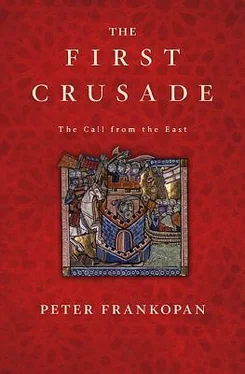Alexios worked hard to woo Philaretos at the start of his reign, awarding him numerous titles and responsibilities. 39But the emperor was not the only suitor: in the early 1080s, Philaretos also began to receive overtures from the Muslim world. His major fiefdom in eastern Asia attracted the attention of the Turks and Philaretos was eventually persuaded to abandon Byzantium and Christianity in around 1084 when he ‘decided to join them and offered himself for circumcision, according to their custom. His son violently opposed this ridiculous impulse, but his good advice went unheeded.’ 40One author expressed his indignation rather more emphatically: ‘the impious and wicked chief Philaretos, who was the very offspring of Satan ... a precursor of the abominable Antichrist, and possessed by a demonical and extremely monstrous character ... began to war against the Christian faithful, for he was a superficial Christian’. 41
For Alexios this was catastrophic news. The prospect of Philaretos recognising the authority of the caliph and the sultan was worrying enough; the threat that, with Melitene, Edessa and Antioch under his control, he might also turn over important towns and provinces to the Turks provoked a serious crisis. Alexios reacted immediately, taking countermeasures to secure the towns and regions the rogue general controlled and transferring them into the hands of loyal supporters. A certain T’oros, or Theodore, whose court title of kouropalates indicates that he was a close retainer of the emperor, took control of Edessa. 42His father-in-law, Gabriel, did the same in Melitene, being named governor of the town. 43Castles, fortresses and other strongpoints in this region were also occupied by commanders loyal to the emperor. 44
Yet it was to Sulayman that Alexios turned to secure Antioch. According to one source, the Turk moved quickly on the city in 1085, travelling via a ‘secret route’ to avoid detection, presumably shown to him by Byzantine guides. When he reached the city, he entered it with little ado and took control of it, harming no one and treating the inhabitants conspicuously well: ‘Peace was re-established, everyone returning to his place unharmed.’ 45Arabic sources likewise comment on the kindness Sulayman showed to Antioch’s inhabitants. 46
The peaceful occupation of Antioch contrasts sharply with the experiences of western knights who tried to take the city just a few years later. Protected by fearsome natural and man-made defences, Antioch was all but impregnable. But Sulayman did not have to use force to take control: he was acting on behalf of the emperor and so the inhabitants of the city – the majority of them Greek-speaking Byzantines – were willing to let him in. The fact that Alexios seems to have made no attempt to counter either the threat of Philaretos’ defection by sending his own troops or stop Sulayman’s move on Antioch is revealing. This was another case of fruitful collaboration between the Turk and the Byzantine.
Later Arabic writers came to present Sulayman’s occupation in glorious terms. In the words of one poet: ‘You have conquered Byzantine Antioch which enmeshed Alexander in its toils/Your steeds have trampled her flanks, and, humbled,/The daughters of the pale face miscarry their unborn children.’ 47However, this was little more than poetic licence, designed to show Antioch as having a Muslim overlord. In fact, after taking the city, Sulayman showed his intentions and his loyalties by immediately suspending the tribute which Philaretos had been paying a local Turkish warlord. When warned that it was dangerous to act against the authority of the sultan, Sulayman responded angrily that he remained obedient to the ruler of Baghdad. In territories subject to the sultan, he replied, there was no question that he was loyal; by implication, therefore, what he did in Nicaea and Antioch – cities belonging to Byzantium – had no bearing on his obligations to the sultan. 48Using the same logic, Sulayman set out from Antioch for Aleppo in the summer of 1085, which had been razed by the Byzantines a century earlier, demanding that its Turkish governor hand the city over to him. It was another town that Alexios was keen to recover. 49
The emperor pinned too much hope on his ally, however. Local Turkish warlords soon recognised that Sulayman was overstretched, with limited resources to hold on to his new gains, let alone make new conquests. In the middle of 1085, shortly after Sulayman had taken Antioch, Tutush, the sultan’s belligerent half-brother, marched on the city and drew him into battle. There was some dispute among contemporaries as to whether Sulayman committed suicide when it became obvious his army had been routed or was killed by an arrow which struck him in the face. Whatever the facts, Antioch was now in Tutush’s hands. 50
This was a major setback for Byzantium. It was also a disaster for Alexios. Focusing his attention on the threats to the western provinces in the early 1080s, the emperor had not campaigned once in Asia Minor, pinning his hopes on two dominant local figures, Sulayman and Philaretos. In a matter of weeks, this policy had unravelled catastrophically.
Things only got worse when reports were received in Constantinople that Abu’l-Kasim, the man whom Sulayman had left in charge of Nicaea, had launched a wave of raids on towns and villages in Bithynia. Other opportunistic Turks were also taking advantage of the situation to establish themselves in Asia Minor, seizing towns and fortresses which had previously been controlled by Sulayman. 51Byzantine authority in the east was on the point of collapse.
The emperor was not alone in his concern about the sudden changes to the status of Antioch and Nicaea. The sultan of Baghdad, MalikShah, also grew alarmed about the situation: the rise in power of local warlords such as Abu’l-Kasim and Tutush threatened to destabilise the Turkish world as much as the Byzantine. 52Like his father Alp Arslan, Malik-Shah was careful to maintain control over his western frontier, often leading expeditions to assert himself over unruly regions which were not of immediate strategic importance to Baghdad but nevertheless vital to the personal power of the sultan. The Turks knew for themselves how important it was to keep an eye on developments in these borderlands; only a few decades earlier they had lingered on the eastern periphery of the caliphate before taking it over completely.
Around the middle of 1086, therefore, Malik-Shah sent envoys to Alexios bearing a letter noting the problems in western Asia Minor. Abu’l-Kasim had failed to respect the agreement which the sultan had made with Sulayman and which had remained intact for several years: ‘I have heard, Emperor, of your troubles. I know that from the start of your reign you have met with many difficulties and that recently, after you had settled the Latin affairs [the Norman attacks of 1081–5], the [Pechenegs] were preparing to make war on you. The emir Abu’lKasim, too, having broken the treaty that Sulayman concluded with you, is ravaging Asia as far as Damalis itself ... If it is your wish that Abu’l-Kasim should be driven from those districts [that he had attacked] and that Asia, together with Antioch, should be subject to you, send me your daughter as wife for the eldest of my sons. Thereafter nothing will stand in your way; it will be easy for you to accomplish everything with my aid, not only in the east, but even as far as Illyrikon and the entire west. Because of the forces I will send you, no one will resist you from now on.’ 53Malik-Shah also promised he would force the Turks to withdraw from the coastal regions and give the emperor his full support to recover all locations that had been lost by the empire. 54Anna Komnene reported that the emperor was bemused by the marriage proposal: he burst out laughing and then muttered that the Devil himself must have put this idea into Malik-Shah’s head. Nevertheless, Alexios did not dismiss it out of hand, sending a delegation to Baghdad to offer ‘vain hopes’ about a marriage tie. 55
Читать дальше











